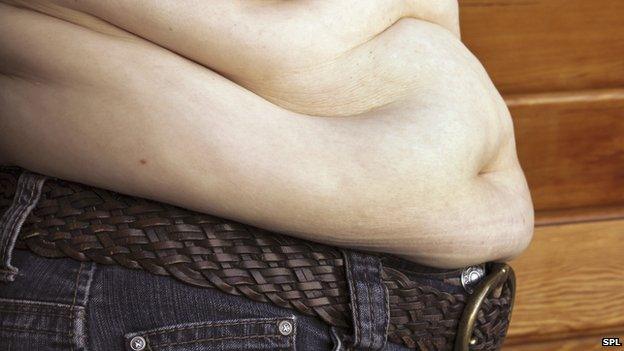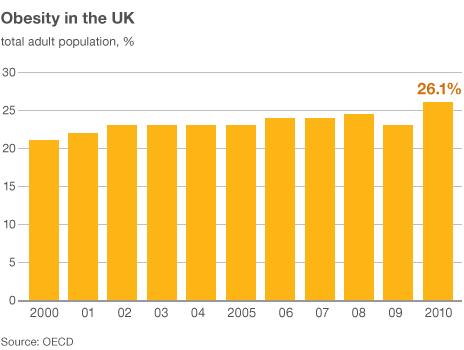Tax fizzy drinks and ban junk food ads, say doctors
- Published
- comments

Obesity is the "single greatest" threat to health, say the doctors
Fizzy drinks should be heavily taxed and junk food adverts banished until after the watershed, doctors have said, in a call for action over obesity.
The Academy of Medical Royal Colleges, which represents nearly every doctor in the UK, said ballooning waistlines already constituted a "huge crisis".
Its report said current measures were failing and called for unhealthy foods to be treated more like cigarettes.
Industry leaders said the report added little to the debate on obesity.
The UK is one of the most obese nations in the world with about a quarter of adults classed as obese, external. That figure is predicted to double by 2050 - a third of primary school leavers are already overweight.
Doctors fear that a rising tide of obesity will pose dire health consequences for the nation.
The Academy of Medical Royal Colleges is a "united front" of the medical profession from surgeons to GPs and psychiatrists to paediatricians. It says its doctors are seeing the consequences of unhealthy diets every day and that it has never come together on such an issue before.
Its recommendations include:
A ban on advertising foods high in saturated fat, sugar and salt before 9pm
Further taxes on sugary drinks to increase prices by at least 20%
A reduction in fast food outlets near schools and leisure centres
A £100m budget for interventions such as weight-loss surgery
No junk food or vending machines in hospitals, where all food must meet the same nutritional standards as in schools
Food labels to include calorie information for children
Prof Terence Stephenson, the chair of the Academy, evoked parallels with the campaign against smoking.
He told the BBC: "That required things like a ban on advertising and a reduction in marketing and the association of smoking with sporting activities - that helped people move away from smoking."

He said there was no "silver-bullet" for tackling obesity, instead the entire culture around eating needed to change to make it easier to make healthy decisions.
"I choose what I eat or whether I smoke, what people have told us is they want help to swim with the tide rather than against the current to make the healthy choice the easy one," he said.
While the report makes a raft of recommendations, Prof Stephenson attacked sugary drinks for being "just water and sugar" and lambasted a culture where it was deemed acceptable to drink a litre of fizzy drink at the cinema.
A tax was needed to help "encourage people to drink more healthy drinks," he said.
"Doctors are often accused of playing the nanny state, we didn't hear from a single person who said they liked being overweight, everybody we met wanted help from the state and society.
"If we didn't have things like this we wouldn't have speed limits that save lives, we wouldn't have drink-driving limits that save lives, there's a host of things that society and state does to help us live long, healthy fulfilling lives and we're just suggesting something similar."
But Terry Jones, of industry body the Food and Drink Federation, said the report "seems to be a damp squib and to add little to an important debate".
"The Academy of Medical Royal Colleges has presented as its recommendations, a collection of unbalanced ideas apparently heavily influenced by single issue pressure groups," he said.
"FDF had hoped that today's report would have looked seriously at how the food industry and the medical profession would have worked together to tackle obesity, and genuinely brought new insights to bear on how to empower healthier choices and change behaviour to deliver better long-term public health outcomes. This report fails to do that."
The British Soft Drinks Association rejected the idea that a tax on soft drinks, which it said contributed "just 2%" of the total calories in the average diet, would address a problem "which is about overall diet and levels of activity".
Temptation
Dr Aseem Malhotra, a cardiologist who helped draw up the report, has noticed more and more of his patients are overweight and suffering from obesity related illnesses.
Calculate your BMI

He told the BBC: "The root cause is the food environment, it's like telling children going into a sweet shop not to eat sweets.
"There's nothing wrong with the occasional treat, but those treats have insinuated themselves into the daily diets of most people.
"There's an oversupply of cheap sugary foods, clearly regulation is needed."
The Department of Health in England has a set up voluntary agreements with the food industry as part of its responsibility deal, external.
Health minister Lord Howe welcomed the report and said he wanted to see "businesses intensifying their efforts as well".
He said: "To tackle the rising tide of obesity the industry, healthcare professionals, government and individuals all need to continue working together to get results, which is why our Call to Action sets out how important this is.
"Government is already helping people make healthier choices by working with industry to reduce fat, salt and sugar in foods and by giving children and families advice on how to eat well, get active, and live longer through Change4Life."
- Published16 April 2012
- Published29 January 2013
- Published20 January 2013
- Published11 August 2011
- Published5 January 2013
- Published1 September 2010